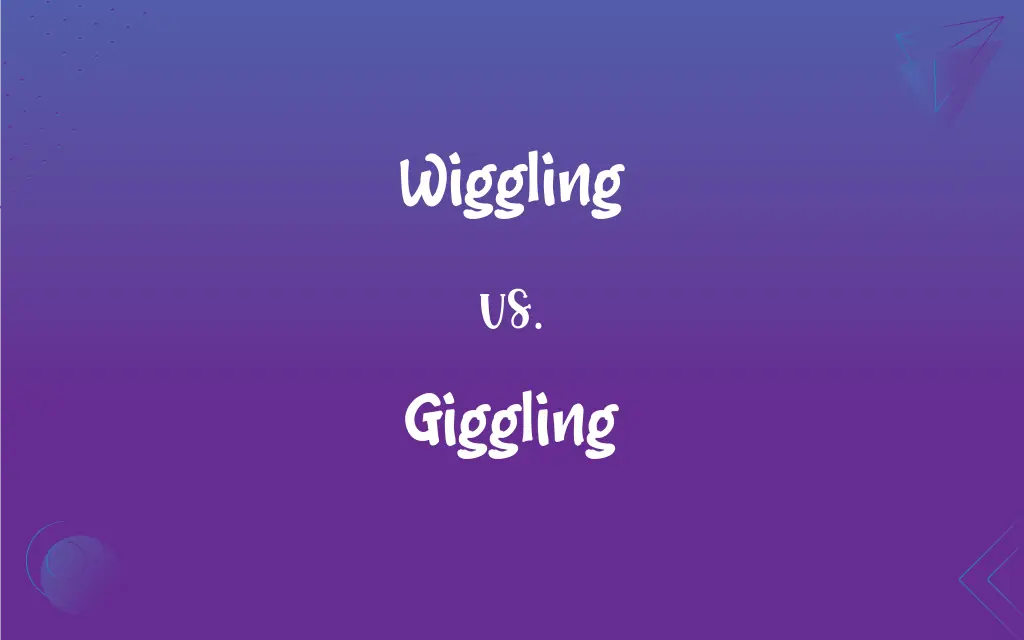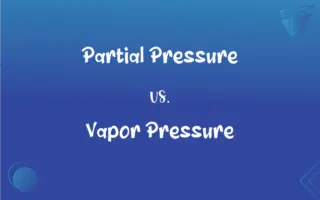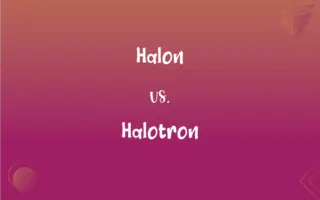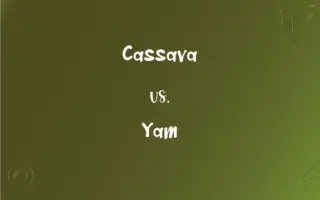Wiggling vs. Giggling: What's the Difference?
Edited by Aimie Carlson || By Janet White || Published on October 17, 2023
Wiggling refers to moving or twisting with short, quick motions, while Giggling means laughing lightly and repeatedly in a silly manner.

Key Differences
Wiggling and Giggling are verbs that describe two distinct actions. While Wiggling focuses on a physical movement, often rapid and back and forth, Giggling pertains to a sound or form of laughter, usually high-pitched and emanating from amusement.
Wiggling can be associated with various contexts, such as a child wiggling their loose tooth or a fish wiggling on a line. In contrast, Giggling is solely connected to the act of laughing, often implying a playful, secretive, or uncontrollable nature to the laughter.
It's fascinating how both Wiggling and Giggling can be instinctual reactions. A ticklish person might wiggle when tickled and giggle from the sensation. While wiggling is a physical attempt to escape the tickling, giggling is the vocal response to the funny feeling.
Body language experts might assess Wiggling as a sign of discomfort, nervousness, or anticipation. A person might wiggle in their seat during an interview or a tense moment. On the other hand, Giggling could be interpreted as a sign of amusement, embarrassment, or even nervousness, revealing the emotional state of the individual.
When we look at how these terms are used in literature and daily conversation, Wiggling often denotes action or movement, like a worm wiggling on the ground. Giggling, however, is more about portraying an emotional response, like children giggling behind their hands while playing a prank.
ADVERTISEMENT
Comparison Chart
Type of Action
Physical movement.
Vocal response.
Common Contexts
Response to touch, discomfort, or anticipation.
Amusement, nervousness, or playfulness.
Body Part Involved
Can involve any part of the body, e.g., fingers, toes.
Usually involves the throat and mouth.
Sound
Generally silent unless described otherwise.
Audible, often high-pitched laughter.
Emotional Connotation
Can denote discomfort, eagerness, or playfulness.
Indicates amusement, sometimes nervousness or embarrassment.
ADVERTISEMENT
Wiggling and Giggling Definitions
Wiggling
A motion indicating discomfort or impatience.
He kept wiggling in his chair during the meeting.
Giggling
Laughing in a light, silly, and often high-pitched manner.
She couldn't help giggling at the comedian's jokes.
Wiggling
Making a series of small, swift movements.
The leaves were wiggling in the wind.
Giggling
Expressing amusement through repeated, soft laughter.
The children were giggling behind the curtain during the game.
Wiggling
Moving from side to side with quick, short motions.
The puppy was wiggling its tail in excitement.
Giggling
Making sounds indicative of suppressed mirth.
He heard giggling coming from the other room during the surprise party.
Wiggling
The act of maneuvering into or through a tight space.
She was wiggling through the crowd to get to the front.
Giggling
Reacting to a funny or awkward situation with laughter.
She was giggling nervously during her first date.
Wiggling
To move back and forth with quick irregular motions
The gelatin wiggled on the plate.
Giggling
Demonstrating amusement without loud, hearty laughter.
They spent the evening giggling over old photos.
Wiggling
To move or proceed with a twisting or turning motion; wriggle
Wiggled restlessly in her chair.
Wiggled through the crowd.
Giggling
To laugh with repeated short, spasmodic sounds.
Wiggling
To insinuate or extricate oneself by sly or subtle means
Wiggled out of a social engagement.
Giggling
To utter while giggling.
Wiggling
To cause to move back and forth with quick irregular motions
Wiggle a loose tooth.
Giggling
A short, spasmodic laugh.
Wiggling
To make (one's way, for example) by or as if by wiggling
The pitcher wiggled his way out of a jam.
Giggling
Present participle of giggle
Wiggling
A wiggling movement or course.
Giggling
The act of producing giggles; high-pitched laughter
Wiggling
Present participle of wiggle
Wiggling
The motion of something that wiggles.
The wigglings of a lively worm
Wiggling
Having a twisting or snake-like or worm-like motion;
Squirming boys
Wiggly worms
Writhing snakes
Wiggling
Shaking or twisting in a certain manner.
She was wiggling her toes in the sand.
FAQs
Is a chuckle the same as a giggle?
Not exactly. A chuckle is a quiet, subdued laugh, while a giggle is often higher-pitched and sillier.
Is wiggling always a sign of discomfort?
No, wiggling can also indicate excitement, playfulness, or eagerness.
Can both wiggling and giggling be involuntary?
Yes, one might wiggle when tickled and giggle as a response to the tickling.
Are there synonyms for wiggling?
Yes, like wriggling, squirming, and twitching.
Does wiggling always involve the entire body?
No, one can wiggle a specific body part, like fingers or toes.
Is giggling considered immature?
While often associated with children, adults can giggle too, especially in lighthearted moments.
Can someone giggle without a specific reason?
Yes, people sometimes giggle out of nervousness or even without any apparent cause.
Can you use wiggling and giggling in the same sentence?
Absolutely! "The ticklish child was wiggling and giggling as his sibling teased him."
Can animals be described as wiggling?
Yes, like a dog wiggling its tail or a worm wiggling on the ground.
Why do people giggle when they're nervous?
It's a natural, often uncontrollable response to diffuse tension or mask unease.
Is giggling ever inappropriate?
In certain serious or solemn situations, giggling might be deemed out of place.
Can wiggling be purposeful?
Yes, like wiggling one's eyebrows suggestively.
What's the opposite of wiggling?
Staying still or motionless.
Is there an age where giggling is most common?
Giggling is often associated with childhood, but it can occur at any age.
Can giggling be silent?
While typically audible, one can "giggle silently" by suppressing the sound.
What emotions are usually associated with giggling?
Amusement, joy, nervousness, or even embarrassment.
Are there cultural differences in wiggling or giggling?
Yes, the contexts or reasons for these actions can vary based on cultural norms and values.
Does wiggling always indicate happiness?
No, it can also show discomfort, impatience, or nervousness.
Can objects wiggle?
Yes, in descriptive writing, like "The flag was wiggling in the breeze."
Do both verbs have a positive connotation?
Generally, yes, but context matters. Wiggling can indicate discomfort, and nervous giggling might show unease.
About Author
Written by
Janet WhiteJanet White has been an esteemed writer and blogger for Difference Wiki. Holding a Master's degree in Science and Medical Journalism from the prestigious Boston University, she has consistently demonstrated her expertise and passion for her field. When she's not immersed in her work, Janet relishes her time exercising, delving into a good book, and cherishing moments with friends and family.
Edited by
Aimie CarlsonAimie Carlson, holding a master's degree in English literature, is a fervent English language enthusiast. She lends her writing talents to Difference Wiki, a prominent website that specializes in comparisons, offering readers insightful analyses that both captivate and inform.








































































